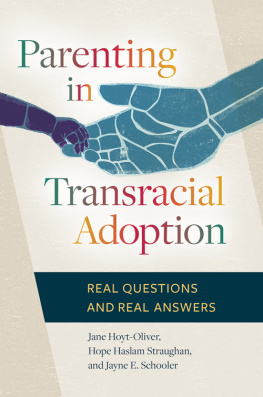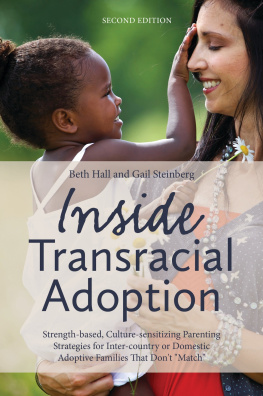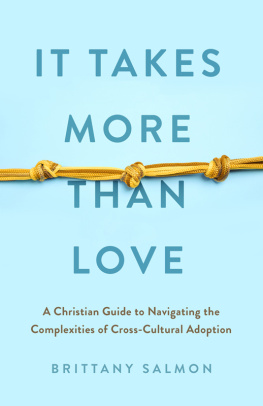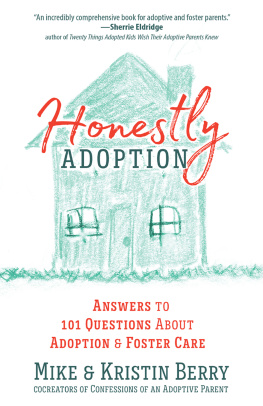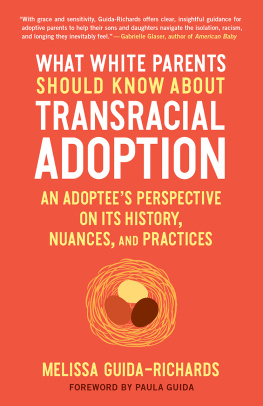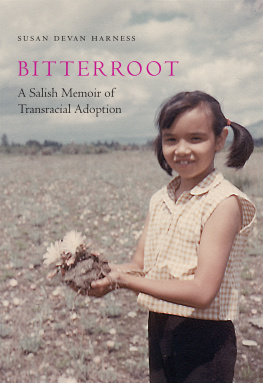

Copyright 2016 by Jane Hoyt-Oliver, Hope Haslam Straughan, and Jayne E. Schooler
All rights reserved. No part of this publication may be reproduced, stored in a retrieval system, or transmitted, in any form or by any means, electronic, mechanical, photocopying, recording, or otherwise, except for the inclusion of brief quotations in a review, without prior permission in writing from the publisher.
Library of Congress Cataloging-in-Publication Data
Names: Hoyt-Oliver, Jane, author. | Straughan, Hope Haslam, author. | Schooler, Jayne E., author.
Title: Parenting in transracial adoption : real questions and real answers / Jane Hoyt-Oliver Ph.D., Hope Haslam Straughan Ph.D., Jayne E. Schooler.
Description: Santa Barbara : Praeger, 2016.
Identifiers: LCCN 2015037395| ISBN 9781440837029 (hardback) | ISBN 9781440837036 (ebook)
Subjects: LCSH: Interracial adoption. | Parenting. | BISAC: FAMILY & RELATIONSHIPS / Adoption & Fostering. | PSYCHOLOGY / Developmental / Adolescent. | PSYCHOLOGY / Developmental / Child.
Classification: LCC HV875.6 .H69 2016 | DDC 649/.145dc23 LC record available at http://lccn.loc.gov/2015037395
ISBN: 978-1-4408-3702-9
EISBN: 978-1-4408-3703-6
201918171612345
This book is also available on the World Wide Web as an eBook.
Visit www.abc-clio.com for details.
Praeger
An Imprint of ABC-CLIO, LLC
ABC-CLIO, LLC
130 Cremona Drive, P.O. Box 1911
Santa Barbara, California 93116-1911
This book is printed on acid-free paper 
Manufactured in the United States of America
To my husband and our wonderful daughter: we journey together in love and I am grateful for the walk every day. To our parents Barbara and Newton Hoyt and Helen and Leon Oliver: your love provided our family both roots and wings. To my brother Robert and sister Ann, without whom growing up would have been far lonelier and much less exciting. And finally to those who create forever families through adoption.
Jane Hoyt-Oliver
To my husband and beautiful sons, thank you for being my forever family, and all that it means. To our extended family, family through our adopted sons, dear friends, and social service support partners who journey along with us, I give my sincere thanks and gratitude for all that you bring to our lives and to my exploration of the ideas contained in this book. To my co-authors, I offer extraordinary gratitude for the privileged, beautiful, and intense journey we have undertaken, and the supports you have been to me throughout.
Hope Haslam Straughan
To Betsy Keefer Smalley, thank you for your ever constant support, enthusiasm, and commitment to the vision of writing to help adoptive families for many years. You have touched lives around the world. Thank you for never saying no when an idea is passed your way!
Jayne E. Schooler
Contents
Acknowledgments
I would like to thank the staff at ABC-CLIO, especially our editor Debbie Carvalko, for their help and support throughout this process. This book would not have been possible without Ms. Carvalkos enthusiasm for our project. The generous support of Malone University was critical; a faculty research grant as well as a semester-long sabbatical provided me with the time to write. Becky Albertson transcribed our interviews with precision; thank you, Becky, for your steadfast work. In addition, the encouragement and backing of faculty in both the departments of Social Work and History/Philosophy/Social Sciences at Malone University often provided inspiration. I admire and thank you all.
Jane Hoyt-Oliver
I have learned so much from hearing the narratives of the many parents who graciously took part in our study, as Ive continued to navigate my own transracially adoptive parenting journey. I want to thank those families, and especially recognize the strengths noted when asked how theyd changed due to being a transracially adoptive parent. The generous support of Wheelock College was critical, specifically providing research grants to pay for transcription. I would also like to thank Debbie Carvalko at ABC-CLIO for her guidance and support.
Hope Haslam Straughan
Without the families who so freely and openly shared their stories, we would not have the wealth of insight we have gained. I would like to thank those families who shared what life experiences have taught them. I also would like to thank Debbie Carvalko and the team at ABC-CLIO for their high level of professionalism and guidance.
Jayne E. Schooler
Introduction
JANE HOYT-OLIVER

Do parents discuss what they believe about race and culture before they adopt?
Do they talk about race and culture within their extended family before they adopt?
Do issues of race and cultural emerge for adoptive parents for which they feel unprepared?
It is these questions and many more which are the subject of this book. In recent decades, researchers have been interested in the effects of transracial adoption on the adoptees. Some of the most poignant writings have been authored by the adoptees themselves (Hofmann, 2010). A good deal of past research emphasis has been placed on the experiences of children who have been adopted from other countries (Simon & Roorda, 2000). A few studies have focused on in-country transracial adoption (Alexander & Curtis, 1996).
From a recognition of the reality of cultural disruption (Simon & Alstein, 1996), to the newly emerging study of the role that trauma plays within the adoption process, social workers and parents have begun to address the expressed needs of adoptees (Schooler, Smalley, & Callahan, 2010). But little research has been conducted to understand how adopting parents view themselves, or how their worldview may affect the family dynamics.
As with many decisions, the reasons that families adopt can be as varied as the families themselves. Some potential parents may want to expand their family by adoption because they cannot biologically have children. Others may feel they have been successful parents to biological children and believe they have more to give as parents. Still others make the choice to adopt for religious reasons, believing that adoption is a way to demonstrate the love of God for all people and an alternative to abortion (Brown, 2012). Thats where parents begin. But, as with many adult whole life decisions (others can include who to marry or, increasingly, whether to marry, how to express ones sexuality, how one balances work requirements and home life, or whether to divorce), people often enter lifelong decisions with limited information. I wish I had known... sometimes seems to be the universal cry of parenthood.
Of course, there are things we simply cant know until we have lived them. For example, there are many books on the market that discuss steps one might take to have a long and happy marriage, and many of those books provide great advice. But long-term partners will acknowledge that all the books in the world could not have prepared them completely to BE lifelong partners. A books suggestions can help, but true grounded learning occurs when knowledge is combined with experience. It takes working it out in action on the part of both partners to accomplish the goal of a strong and steady relationship.
Next page
